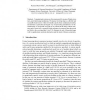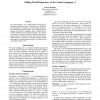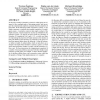AML
2002
15 years 1 months ago
2002
For a classical theory T, H(T) denotes the intuitionistic theory of T-normal (i.e. locally T) Kripke structures. S. Buss has asked for a characterization of the theories in the ra...
ENTCS
2008
15 years 2 months ago
2008
This paper considers QLtl, a quantitative analagon of Ltl and presents algorithms for model checking QLtl over quantitative versions of Kripke structures and Markov chains.
ENTCS
2008
15 years 2 months ago
2008
Rewrite theories and their associated Kripke structures constitute a flexible and executable framework in which a wide range of systems can be studied. We present a general notion...
103
click to vote
WADT
2004
Springer
15 years 7 months ago
2004
Springer
Abstract. Computational systems are often represented by means of Kripke structures, and related using simulations. We propose rewriting logic as a flexible and executable framewo...
124
click to vote
NMR
2004
Springer
15 years 7 months ago
2004
Springer
The action language A is a simple high-level language for describing transition systems. In this paper, we extend the action language A by allowing a unary modal operator in the u...
CALCO
2005
Springer
15 years 7 months ago
2005
Springer
Simulations are a very natural way of relating concurrent systems, which are mathematically modeled by Kripke structures. The range of available notions of simulations makes it ver...
118
click to vote
ATVA
2007
Springer
15 years 8 months ago
2007
Springer
Multi-valued Kripke structures are Kripke structures in which the atomic propositions and the transitions are not Boolean and can take values from some set. In particular, latticed...
107
click to vote
ATAL
2007
Springer
15 years 8 months ago
2007
Springer
We develop a model of normative systems in which agents are assumed to have multiple goals of increasing priority, and investigate the computational complexity and game theoretic ...



